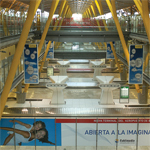Madrid Financial Centre: Safe and sound despite the crisis
Madrid's robust financial business model has enabled the city to survive the global recession relatively unscathed. Now the Spanish capital is looking to leverage its world-class business environment and transport facilities to strengthen its presence in Latin America, says Isabel Martin Castellá.
The international financial crisis has proved to be an opportunity for Madrid's financial sector to demonstrate its resilience to the world. While competing financial centres have witnessed the collapse of a number of financial giants, Madrid has managed to maintain a financial sector as bright as its 300 days of sunlight per year.
Vibrant scene: Madrid's quality of life is second to none, and the new, award-winning T4 terminal at Barajas airport boosts the city's status as Europe's gateway to Latin America
Indeed, Madrid has had the chance to demonstrate its ability to export more than leisure and gastronomy; the city's robust financial business model has also set an example to the rest of the world. While it is certainly true that the Bank of Spain and CNMV, the stock market supervisory agency, have been key to the solidity of Spain's financial sector - a fact acknowledged by international regulators and supervisors, and its dynamic provisioning scheme cited by the European Central Bank as a model for Europe - banks have also played an important role in the equation. Spain's institutions have consistently focused on their core retail banking activities, and this prudent behaviour has not gone unrewarded, but has narrowed the gap between Madrid and other financial centres.
Gateway to Latin America
International publications have recently praised the Spanish banking system, in which exposure to toxic assets has remained at a much lower level than in other countries. This has allowed Spain's banks to continue expanding their international activity in US and Latin America. The latter is a key region when presenting Madrid as a global financial centre. This is because linguistic and cultural ties, similar regulatory systems, broader airline coverage throughout Latin America and strong Spanish banking presence in the region make Madrid the European gateway to Latin American markets. The Latibex market, trading stocks of the most prominent Latin American 'multilatinas' companies listed in the Madrid Stock Exchange, is a clear example of this potential.
The Madrid Stock Exchange leads us to other incentives offered in Madrid, such as the local government's financial support of small and medium-sized enterprises willing to be listed on the Madrid Alternative Stock Market (Mercado Alternativo Bursátil or MAB). Madrid's regional government is also committed to fostering business-friendly environments by promoting fiscal reduction schemes (for those taxes that fall within its competence) and launching incentives to promote entrepreneurship (eliminating red tape) and innovation (fiscal incentives and deductions for research and development activities).
Madrid is also headquarters to internationally recognised Spanish business schools, law firms, consultancies and service providers, turning the city into a pool of cross-sectoral knowledge and expertise, resulting in high levels of efficiency and innovation in the financial sector. With regards to technical support, consultancies KPMG, Capgemini, PricewaterhouseCoopers and Deloitte highlighted in a recent study commissioned by Madrid Centro Financiero the attractiveness of the city's financial sector for both exporting service delivery and bringing international business to Madrid. Moreover, Madrid offers interesting incentives as a business centre, thanks to excellent infrastructure, boasting as it does the main departure station for all the cross-country high-speed AVE train lines, the starting point of Spain's radial road system, and Barajas airport, the fourth busiest airport in Europe by number of passengers, where the new T4 terminal has received many awards.
Madrid's considerable capacity for hotel and leisure establishments, and its outstanding quality of life, was noted by the reputed British magazine Monocle, in which Madrid ranked first under the headline "Madrid, quality of life and business fusion". The review rated Madrid as the best city in the world to carry out business.
Taking on board the above points we can only encourage investors and businesses to recognise Madrid as a leading financial centre which bridges the gap between business and lifestyle.
Isabel Martin Castellá is the managing director at Madrid Centro Financiero.
Madrid Finance Centre
Internationally, Spain and the Community of Madrid have been ranked highly by the rating agencies. This is due to positive perceptions of financial stability and security, arising from membership in the eurozone. The transparency and freedom which makes business operations safer, and good foreign relations, also provide an image which serves to consolidate Madrid's position as a global financial centre. The Community of Madrid's reputation in other aspects is worthy of similar consideration. The high number of tourists, the importance of leisure activities and investment in health and transport infrastructure makes Madrid one of the most attractive regions in Europe.
Contact Details
Address: Jose Abascal 56, 3rd floor, 28003 Madrid, Spain
Telephone number: +34 91 399 75 81
Website: wwwmadridfinancialcentre.org




